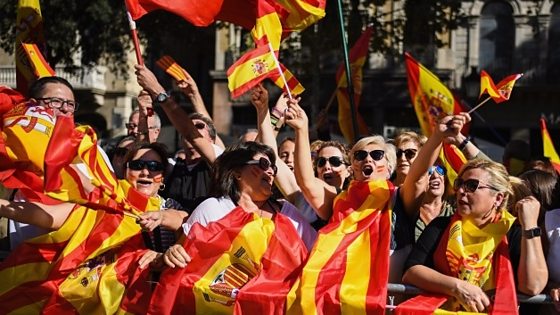
Spain is set to put in place measures to take direct control of Catalonia in response to the region`s declaration of independence last week.
On Friday, Madrid stripped Catalonia of its autonomy and removed Catalan leader Carles Puigdemont from office.
The temporary move will see as many as 150 of the region`s ministers replaced. Some have vowed to continue to work.
Mr Puigdemont and other Catalan officials may face criminal charges, a move likely to lead to huge protests.
What happens next?
Spain`s central government is to take control of Catalan institutions with Spanish officials expected to be put in place in the region`s ministries on Monday.
Mr Puigdemont and his vice-president Oriol Junqueras have said they do not accept the move by Madrid, adding that they could only be removed from power by the citizens of Catalonia.
If Mr Puigdemont and others refuse to step aside, they face possible arrest.
Attention is now focused on the headquarters of the Catalan government to see if Mr Puigdemont turns up for work.
About 200,000 civil servants are due to arrive on Monday, but it is not clear how many will stay away or refuse to follow instructions.
Catalonia`s regional police force, known as Mossos, whose chief was dismissed last week, are deployed in Sant Jaume square, near the government palace in the centre of Barcelona.
Spain`s Foreign Minister Alfonso Dastis has said he expects the officers to "act professionally".
Spain`s chief prosecutor has also been preparing criminal charges against any officials considered to have acted against Spanish law in declaring independence following a referendum deemed illegal under the Spanish constitution.
Meanwhile, Madrid has called for fresh regional elections on 21 December.
Mr Puigdemont could run in new elections, according to Mr Dastis, but only if the sacked Catalan leader has not been jailed.
What about Catalonia`s autonomy?
On Sunday, Mr Dastis told Sky News: "We are not taking autonomy away from Catalonia. We are just re-establishing it, in fact."
He added: "Reality is already sinking in, will continue sinking in and they will realise that they cannot do something without the authority of law and they will be usurping authority."
Meanwhile, Interior Minister Juan Ignacio Zoido has written to all police officers in Catalonia asking for their loyalty as a "new era" begins in the region.
He reminded members of the regional police, who are now under direct control from Madrid, of their duty to obey orders and to guarantee "the rights and liberties of all".
Senior police officers have told the BBC that they have already complied with an order to remove framed photographs of Mr Puigdemont from police stations across the region.
What is the local press saying?
Rule from Madrid
Spain has been gripped by a constitutional crisis since a referendum, organised by Mr Puigdemont`s separatist government, was held earlier this month in defiance of a ruling by the Constitutional Court which had declared it illegal.
The Catalan government said that of the 43% of potential voters who took part, 90% were in favour of independence.
Friday saw the regional parliament declare independence.
Spanish Prime Minister Mariano Rajoy then announced the dissolution of the regional parliament and the removal of Mr Puigdemont as Catalan leader.
Mr Puigdemont has urged "democratic opposition" to direct rule from Madrid.
Belgium`s Migration Minister Theo Francken has said the separatist leader could be given asylum protection which Spain would find difficult to reverse.
"If you see the situation at the moment, the prison sentences and the repression from Madrid and the prison sentences that are bandied about. the question is obviously whether somebody like that has the chance of a fair trial," he told Reuters.
There is no suggestion that Mr Puigdemont is seeking to leave Catalonia.
Before Madrid took over the Catalan government, the region had one of the greatest levels of self-government in Spain.
It has its own parliament, police force and public broadcaster, as well as a government and president, though those have now been dismissed.
Catalans had a range of powers in many policy areas from culture and environment to communications, transportation, commerce and public safety.


0 comments:
Post a Comment